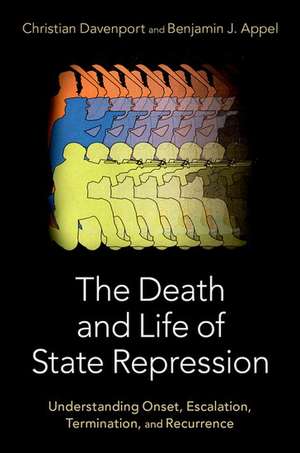The Death and Life of State Repression: Understanding Onset, Escalation, Termination, and Recurrence
Autor Christian Davenport, Benjamin Appelen Limba Engleză Paperback – 16 dec 2022
| Toate formatele și edițiile | Preț | Express |
|---|---|---|
| Paperback (1) | 162.80 lei 10-16 zile | |
| Oxford University Press – 16 dec 2022 | 162.80 lei 10-16 zile | |
| Hardback (1) | 499.07 lei 10-16 zile | +107.54 lei 6-10 zile |
| Oxford University Press – 10 noi 2022 | 499.07 lei 10-16 zile | +107.54 lei 6-10 zile |
Preț: 162.80 lei
Preț vechi: 176.91 lei
-8% Nou
Puncte Express: 244
Preț estimativ în valută:
31.16€ • 33.83$ • 26.17£
31.16€ • 33.83$ • 26.17£
Carte disponibilă
Livrare economică 22-28 martie
Preluare comenzi: 021 569.72.76
Specificații
ISBN-13: 9780197654927
ISBN-10: 0197654924
Pagini: 232
Ilustrații: 65 halftones
Dimensiuni: 237 x 153 x 14 mm
Greutate: 0.35 kg
Editura: Oxford University Press
Colecția OUP USA
Locul publicării:New York, United States
ISBN-10: 0197654924
Pagini: 232
Ilustrații: 65 halftones
Dimensiuni: 237 x 153 x 14 mm
Greutate: 0.35 kg
Editura: Oxford University Press
Colecția OUP USA
Locul publicării:New York, United States
Recenzii
This book is a comprehensive, ambitious, and sober analysis of the life cycles of large-scale spells of state repression. Most importantly, Davenport and Appell find that domestic politics—not international politics—are the most crucial in curtailing the onset, escalation, and persistence of state repression. For all its imperfections, democracy tends to prevent a state from initiating mass violence, and nonviolent civil resistance tends to prevent such repression from escalating. This book upends much of what we thought we knew about state repression--and what can be done to stop it. A must-read.
Christian Davenport is the world's leading scholar of state repression and has made a great team with Benjamin Appel. The Death and Life of State Repression is an instant classic. It analyzes the correlates of entire spells of repression - how they start, how they end, and, importantly, how they escalate. Using new data, rigorous methods, deep case knowledge, and unparalleled creativity, Davenport and Appel show that there is no one-way, linear relationship between democratization and different forms of human rights violations. While democratization processes can reduce state repression, they can in turn be shaped by the legacies of repressive practices and by the interventions that try to end them. Their book has implications for the broader literature on democratization and will be the standard against which all subsequent contributions in the repression literature are measured.
The Death and Life of State Repression provides academics with an insightful and perceptive analysis that should fundamentally reconceptualize the study of large-scale human rights abuses, while offering governments and activists new insights into how to reverse such atrocities. A tour de force by Christian Davenport, one of the world's deepest thinkers on political violence, and Benjamin Appel.
This book represents a tour de force that is a must-read for all interested in stopping state repression—from scholars, to policymakers, activists, and the general public. The authors offer a new ontology of repression to study its onset, escalation, duration, and recurrence. They then meticulously examine the influence of a full range of domestic and international factors that have been proposed to curtail repression. Their sobering findings reveal that not much has helped, but there is hope, and we can do better. Indeed, the book offers a path forward to understand exactly how we can better protect people from the most vicious forms of state repression.
Christian Davenport is the world's leading scholar of state repression and has made a great team with Benjamin Appel. The Death and Life of State Repression is an instant classic. It analyzes the correlates of entire spells of repression - how they start, how they end, and, importantly, how they escalate. Using new data, rigorous methods, deep case knowledge, and unparalleled creativity, Davenport and Appel show that there is no one-way, linear relationship between democratization and different forms of human rights violations. While democratization processes can reduce state repression, they can in turn be shaped by the legacies of repressive practices and by the interventions that try to end them. Their book has implications for the broader literature on democratization and will be the standard against which all subsequent contributions in the repression literature are measured.
The Death and Life of State Repression provides academics with an insightful and perceptive analysis that should fundamentally reconceptualize the study of large-scale human rights abuses, while offering governments and activists new insights into how to reverse such atrocities. A tour de force by Christian Davenport, one of the world's deepest thinkers on political violence, and Benjamin Appel.
This book represents a tour de force that is a must-read for all interested in stopping state repression—from scholars, to policymakers, activists, and the general public. The authors offer a new ontology of repression to study its onset, escalation, duration, and recurrence. They then meticulously examine the influence of a full range of domestic and international factors that have been proposed to curtail repression. Their sobering findings reveal that not much has helped, but there is hope, and we can do better. Indeed, the book offers a path forward to understand exactly how we can better protect people from the most vicious forms of state repression.
Notă biografică
Christian Davenport is the Mary Ann and Charles R. Walgreen Professor of the Study of Human Understanding, Professor of Political Science and Faculty Associate at the Institute for Social Research at the University of Michigan, Research Professor at the Peace Research Institute Oslo and Elected Fellow at the American Association for the Arts and Sciences. Benjamin J. Appel is Associate Professor at the School of Global Policy and Strategy, University of California, San Diego.
